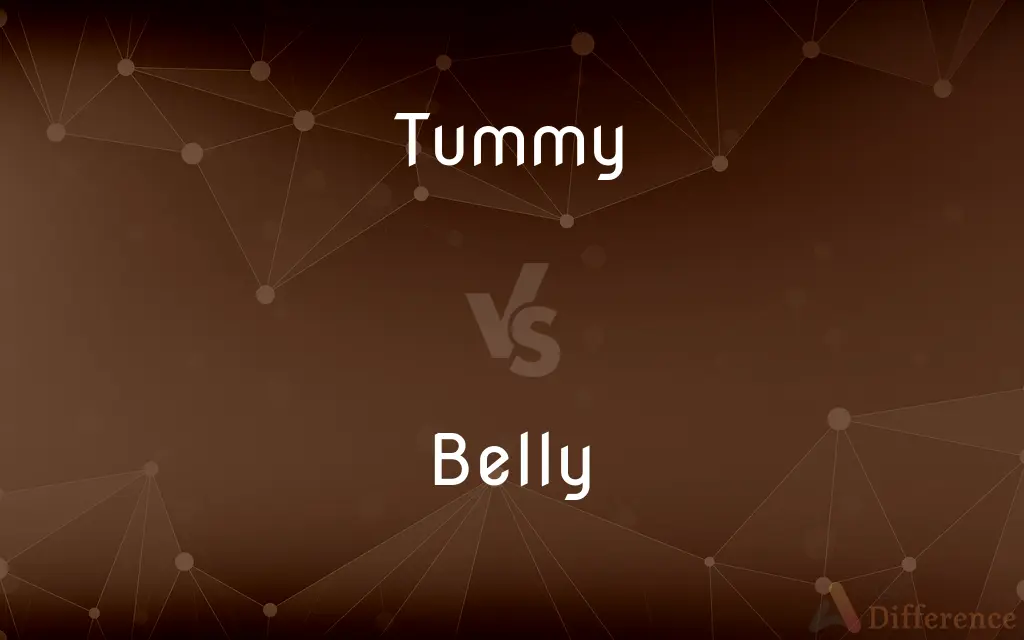Tummy vs. Belly — What's the Difference?
By Tayyaba Rehman & Fiza Rafique — Updated on March 15, 2024
"Tummy" is often used in more informal, endearing contexts, typically with children. "Belly" is versatile, used in casual and more formal settings, and can apply to animals and humans.

Difference Between Tummy and Belly
Table of Contents
ADVERTISEMENT
Key Differences
Tummy refers to the stomach or abdominal area in a more informal, affectionate manner. It's commonly used when talking with or about children, or in a playful, light-hearted context among elders. The term "tummy" tends to convey a softer, more endearing tone, making it suitable for conversations or situations that are informal or require a gentle touch. Belly, on the other hand, is a more all-encompassing term that can refer to the stomach area of humans and animals alike. It's used in both casual and more formal contexts compared to "tummy". "Belly" can describe the abdominal area in general terms, including its internal and external aspects, and is often used in a broader range of discussions about health, anatomy, and even expressions (e.g., "belly laugh").
While both terms denote the abdominal region, their usage is influenced by the tone and context of the conversation. "Tummy" is more likely to be used in contexts that are nurturing or whimsical, whereas "belly" can be used in those same contexts as well as in more serious or technical discussions. This difference in usage highlights the nuanced choice between the two based on the audience and the nature of the discussion.
The choice between "tummy" and "belly" can also reflect the speaker's relationship with the audience or subject. For instance, a parent might refer to their child's "tummy" in a comforting manner but use "belly" when discussing medical concerns with a doctor. Similarly, "belly" is more likely to be used in scientific or anatomical references, where precision and neutrality are important.
In literature and media, "tummy" is often associated with youthful or endearing characters, underscoring innocence or a need for comfort. "Belly", however, might be employed in a wide array of contexts, from comedic to descriptive, reflecting its versatility in language. This distinction not only affects how the terms are used but also how they are perceived by different audiences.
Comparison Chart
Tone
Informal, affectionate
Versatile, ranging from casual to formal
ADVERTISEMENT
Context
Often used with or about children, or in playful conversation
Applies to both humans and animals, in a variety of discussions
Connotation
Soft, endearing
Broad, can be anatomical or humorous
Usage
Nurturing or whimsical situations
Broader usage including health, anatomy, and expressions
Audience
Typically directed towards or about children
Wide audience, including medical professionals
Compare with Definitions
Tummy
Can denote a need for comfort or nurturing.
Her tummy was upset, so she drank some tea to soothe it.
Belly
Used in casual and more serious contexts.
His belly ached from laughing so hard at the joke.
Tummy
Often appears in light-hearted, playful dialogues.
He joked about his tummy being too full for dessert.
Belly
Can refer to internal and external aspects of the abdomen.
Belly breathing is a technique used in meditation.
Tummy
Refers to the stomach, especially in a gentle or affectionate manner.
The little boy said his tummy hurt after eating too much candy.
Belly
Appears in expressions and idiomatic language.
She had a belly laugh that could be heard across the room.
Tummy
Commonly used in contexts involving children.
She rubbed her child's tummy to help him feel better.
Belly
Utilized in discussions about health and anatomy.
The doctor examined his belly for signs of discomfort.
Tummy
Used in advertising and products targeting children or health.
The tummy-soothing tea is popular among parents.
Belly
Describes the stomach or abdominal area of humans and animals.
The dog rolled over to show its belly.
Tummy
The abdomen.
Belly
See abdomen.
Tummy
The stomach.
Belly
The underside of the body of certain vertebrate animals, such as a snake.
Tummy
Stomach or belly.
Belly
A cut of meat from the underside of an animal, especially a pig.
Tummy
Protruding belly, paunch.
Belly
The stomach.
Tummy
Slang terms for a paunch
Belly
An appetite for food.
Tummy
An enlarged and muscular saclike organ of the alimentary canal; the principal organ of digestion
Belly
The womb; the uterus.
Belly
A part that bulges or protrudes
The belly of a sail.
Belly
(Anatomy) The bulging, central part of a muscle.
Belly
A deep or central interior space
The engine in the belly of a ship.
Fish down in the belly of a river.
Belly
To bulge or cause to bulge.
Belly
The abdomen, especially a fat one.
You've grown a belly over Christmas! Time to join the gym again.
Belly
The stomach.
My belly was full of wine.
Belly
The womb.
Belly
The lower fuselage of an airplane.
Belly
The part of anything which resembles (either closely or abstractly) the human belly in protuberance or in concavity; often, the fundus#Noun (innermost part).
The belly of a flask, muscle, violin, sail, or ship
Belly
The main curved portion of a knife blade#Noun.
Belly
(architecture) The hollow part of a curved or bent timber#Noun, the convex part of which is the back.
Belly
To position one’s belly; to move on one’s belly.
Belly
(intransitive) To swell and become protuberant; to bulge or billow.
Belly
(transitive) To cause to swell out; to fill.
Belly
That part of the human body which extends downward from the breast to the thighs, and contains the bowels, or intestines; the abdomen.
Belly
The under part of the body of animals, corresponding to the human belly.
Underneath the belly of their steeds.
Belly
The womb.
Before I formed thee in the belly I knew thee.
Belly
The part of anything which resembles the human belly in protuberance or in cavity; the innermost part; as, the belly of a flask, muscle, sail, ship.
Out of the belly of hell cried I.
Belly
The hollow part of a curved or bent timber, the convex part of which is the back.
Belly
To cause to swell out; to fill.
Your breath of full consent bellied his sails.
Belly
To swell and become protuberant, like the belly; to bulge.
The bellying canvas strutted with the gale.
Belly
The region of the body of a vertebrate between the thorax and the pelvis
Belly
A protruding abdomen
Belly
A part that bulges deeply;
The belly of a sail
Belly
The hollow inside of something;
In the belly of the ship
Belly
The underpart of the body of certain vertebrates such as snakes or fish
Belly
Swell out or bulge out
Common Curiosities
Can "belly" be used affectionately like "tummy"?
Yes, "belly" can be used affectionately, though it's more versatile and can fit into a broader range of contexts.
Are there medical contexts where "tummy" is preferred over "belly"?
Generally, "belly" is more likely to be used in medical contexts due to its broader, more neutral connotation, though "tummy" might be used for comfort, especially with children.
Is "tummy" only appropriate for use with children?
Primarily, yes, but it's also used affectionately among elders in casual, nurturing contexts.
How do cultural differences influence the use of "tummy" vs. "belly"?
Cultural norms and the level of formality in communication can influence the preference for one term over the other, with "tummy" often perceived as more informal and endearing.
Is one term considered more anatomically correct than the other?
"Belly" is more likely to be used in anatomical or scientific contexts, but both terms refer to the stomach or abdominal area.
Why might someone choose "tummy" over "belly" in advertising?
"Tummy" might be chosen for its softer, more comforting connotation, especially in products or services aimed at children or health and wellness.
Do "tummy" and "belly" have synonyms with similar connotations?
Yes, synonyms like "stomach" and "abdomen" share similar meanings but vary in formality and context.
Is it common to use "tummy" in professional healthcare settings?
While "belly" is more common, healthcare professionals may use "tummy" when communicating with children to make them feel more at ease.
Can "belly" have negative connotations?
In some contexts, "belly" might be used in a way that emphasizes excess or gluttony, but it generally depends on the tone and intent of the speaker.
Are there any humorous or idiomatic expressions that use "belly"?
Yes, expressions like "belly laugh" or "butterflies in one's belly" use "belly" in a way that can evoke humor or describe feelings.
How do these terms reflect the speaker's relationship with the audience or subject?
Using "tummy" can indicate a closer, more affectionate relationship, or a desire to comfort, while "belly" is more neutral, suitable for a wide range of relationships and contexts.
Does the choice between "tummy" and "belly" affect the tone of children's literature?
Absolutely, "tummy" can create a more nurturing, gentle tone in children's literature, while "belly" might be used for a wider range of expressions or descriptions.
Share Your Discovery

Previous Comparison
Sale vs. Discount
Next Comparison
Human vs. PersonAuthor Spotlight
Written by
Tayyaba RehmanTayyaba Rehman is a distinguished writer, currently serving as a primary contributor to askdifference.com. As a researcher in semantics and etymology, Tayyaba's passion for the complexity of languages and their distinctions has found a perfect home on the platform. Tayyaba delves into the intricacies of language, distinguishing between commonly confused words and phrases, thereby providing clarity for readers worldwide.
Co-written by
Fiza RafiqueFiza Rafique is a skilled content writer at AskDifference.com, where she meticulously refines and enhances written pieces. Drawing from her vast editorial expertise, Fiza ensures clarity, accuracy, and precision in every article. Passionate about language, she continually seeks to elevate the quality of content for readers worldwide.














































